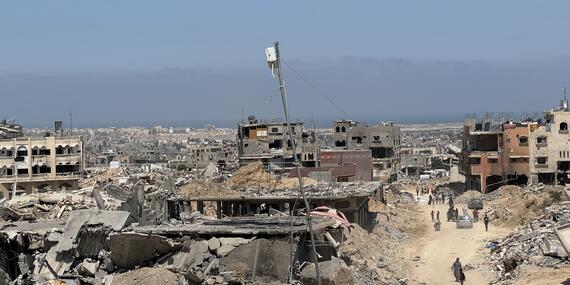Today's top news: Occupied Palestinian Territory, Ukraine, Sudan, Haiti

Occupied Palestinian Territory
OCHA reports that ongoing bombardment and hostilities continue to kill, injure and displace Palestinians – as well as damage and destroy the homes and infrastructure they rely on.
In just the past 48 hours, three schools sheltering displaced people in Gaza city were reportedly hit, resulting in dozens of casualties, according to Palestinian Civil Defence. Partners on the ground are assessing the needs of people who fled and have been providing assistance.
Meanwhile, a new analysis by UN Satellite Centre found that, as of a month ago, 63 per cent of structures in Gaza had been damaged.
Yesterday, the Israeli military issued a new evacuation order for people living in areas of southern Khan Younis and northern Rafah to immediately move westwards to Al Mawasi. Humanitarian partners tracking population movements in Gaza estimate that more than 11,000 people had been living in the areas affected by this evacuation order. Initial mapping indicates that those areas encompass about 18 square kilometres with more than 40 displacement sites, 12 schools, two functioning medical points, and nearly 20 water and sanitation facilities.
We call once again for all parties to the conflict to respect their obligations under international humanitarian law, including by taking constant care to spare civilians and civilian objects. This includes allowing civilians to leave for safer areas and allowing their return as soon as circumstances allow. People must be able to receive humanitarian assistance, whether they move or stay.
As the violence continues, the humanitarian crisis in Gaza is deepening. Our partners reported a surge in malnutrition cases among children in northern Gaza last month. They noted a more than 300 per cent increase in July – when more than 650 cases of acute malnutrition were diagnosed – compared to May, when 145 such cases were detected.
Humanitarian partners say nutrition conditions are worsening due to access constraints, shortages in essential supplies, limited availability of fresh produce and meat, poor water and sanitation services, and spreading diseases.
For example, acute supply shortages meant that just 8 per cent of the nearly 50,000 children whom our partners had been aiming to reach in northern Gaza were able to receive those supplies last month.
Improved humanitarian access is urgent to ensure that children, as well as pregnant and breastfeeding mothers, get the support they need.
Ukraine
Hostilities continued over the weekend and today in front-line regions in the east of Ukraine.
Local authorities reported more than 70 civilian casualties, including children, as well as extensive damage to homes and health and education facilities.
The towns of Pokrovsk, Myrnohrad and Toretsk, in the Donetsk Region, were particularly affected, with repeated strikes damaging at least five education and health facilities and injuring two children.
Due to the worsening security situation, local authorities initiated a mandatory evacuation of children in six towns and villages in the Donetsk Region, offering temporary accommodation and support to evacuated families. Aid organizations, notably in western Ukraine, provided basic assistance, psychosocial support, and other services to the evacuees.
During the first half of this year, aid workers provided humanitarian assistance to more than 440,000 people in the Donetsk Region, where aid remains a lifeline for devastated communities.
Sudan
OCHA warns that active conflict and worsening flooding continue to fuel misery across Sudan, including in North Darfur.
On Saturday, fighting in the state capital Al Fasher reportedly displaced nearly 2,000 people from the Al Salam camp. As you may remember, the Famine Review Committee warned last week that famine conditions are likely prevalent in Al Salam camp.
In Zamzam camp, where famine conditions have been confirmed, more than 5,000 people have been displaced due to heavy rains in recent weeks. There are alarming reports that latrines and water points are being flooded, increasing the risk of waterborne diseases at a time when people are already dying from hunger and illness.
The UN and humanitarian partners are trying to scale up assistance in these and other hunger hotspots in Sudan, but we continue to face major challenges, including access constraints, impassable roads and funding gaps for the aid operation.
We call for safe and unimpeded humanitarian access, including across borders and battle lines, to stop a large-scale famine from taking hold.
Haiti
OCHA remains concerned about the protection of civilians in Haiti's capital Port-au-Prince and neighbouring towns, as well as in the Artibonite Department in the north, where violence continues to displace families.
Despite the volatile context, the UN and partners in Haiti continue to support people in need.
Since the beginning of March, partners distributed 29.5 million liters of drinking water to nearly 97,000 displaced people across the country, including in Port-au-Prince and Léogane. Partners have also distributed 17,000 hygiene kits to nearly 70,000 displaced people living in these areas.
Since March, the World Food Programme has distributed more than 1.6 million hot meals to 132,000 displaced people across Port-au-Prince.
Over the last two weeks, health partners reached more than 1,300 children with psychosocial and mental health support activities across displaced sites in Port-au-Prince, and provided water and sanitation support.
